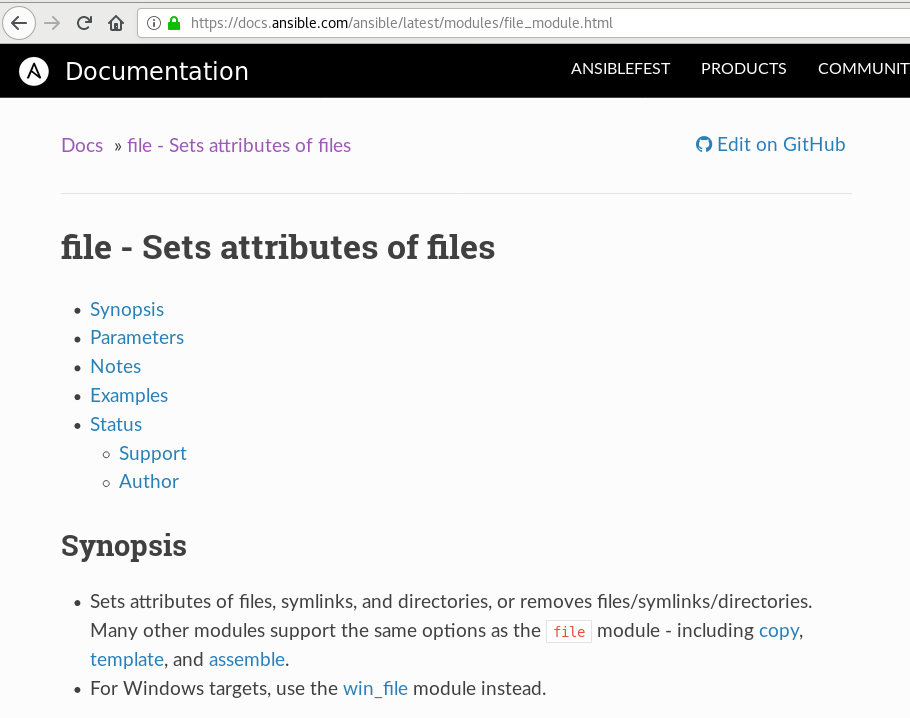Ansible 101
Intro
Ansible is an IT automation tool. It can configure systems, deploy software, and orchestrate more advanced IT tasks such as continuous deployments or zero downtime rolling updates.
Intro
Ansible is an IT automation tool. It can configure systems, deploy software, and orchestrate more advanced IT tasks such as continuous deployments or zero downtime rolling updates.
Intro
Ansible is an IT automation tool. It can configure systems, deploy software, and orchestrate more advanced IT tasks such as continuous deployments or zero downtime rolling updates.
Intro
Ansible is an IT automation tool. It can configure systems, deploy software, and orchestrate more advanced IT tasks such as continuous deployments or zero downtime rolling updates.
“Push model”
👩🏾 💻 local
⬇️ SSH
🖥️ Server
“Push model”
👨🏿 💻 local
⬇️ SSH ⬇️ SSH ⬇️ SSH
🖥️ 🖥️ 🖥️ Servers
“Push model” via CI
👩🏼 💻 local
⬇️ GIT
🖥️ Gitlab & Gitlab-CI
⬇️ SSH ⬇️ SSH ⬇️ SSH
🖥️ 🖥️ 🖥️ Servers
DISCLAIMER
⚠ YAML all-the-things ⚠

Vocabulary
Vocabulary
- ⨊ modules provided by Ansible (e.g.
file,copy,apt, …) - 📝 Tasks (calling an Ansible module)
- 📦 Roles defined by community or us (A packaged set of tasks)
- 🖥️ Inventories defined by us (A list of servers and associated vars)
-
hostsfile -
group_vars/variables -
host_vars/variables
-
- 📦➡️🖥️ Playbook (Applying a set of roles to an inventory)
Modules
(e.g. file, copy, apt, …)
file module

file module
| Parameter | Choices/Defaults | Comments |
|---|---|---|
| path required | path to the file being managed. Aliases: dest, name | |
| state | Choices: absent directory file ← hard link touch | If directory, all intermediate subdirectories will be created if they do not exist. Since Ansible 1.7 they will be created with the supplied permissions. If file, the file will NOT be created if it does not exist; see the touch value or the copy or template module if you want that behavior. If link, the symbolic link will be created or changed. Use hard for hardlinks. If absent, directories will be recursively deleted, and files or symlinks will be unlinked. Note that absent will not cause file to fail if the path does not exist as the state did not change. If touch (new in 1.4), an empty file will be created if the path does not exist, while an existing file or directory will receive updated file access and modification times (similar to the way `touch` works from the command line). |
| force bool | Choices: no ← yes | … |
| group | … | |
| mode | … | |
| owner | … |
file module
- name: Create nginx needed directories
file:
path: /etc/nginx/conf.d
state: directory
Run file module
👨🏻 💻 Run a single module with
> ansible -m file --args "state=touch path=/tmp/coucou" localhost
localhost | SUCCESS => {
"changed": true,
"dest": "/tmp/coucou",
"failed": false,
"gid": 27,
"group": "sudo",
"mode": "0644",
"owner": "paul",
"size": 0,
"state": "file",
"uid": 1000
}
> ls -l /tmp/coucou
-rw-r--r-- 1 paul sudo 0 Aug 27 14:48 /tmp/coucou
apt module
- name: Install nginx.
apt:
update_cache: yes
cache_valid_time: 86400
name: nginx
state: present
1850 modules available!
At the time of writing taken from https://docs.ansible.com/ansible/latest/modules/
Vocabulary
- ⨊ modules provided by Ansible (e.g.
file,copy,apt, …) - 📝 Tasks (calling an Ansible module)
- 📦 Roles defined by community or us (A packaged set of tasks)
- 🖥️ Inventories defined by us (A list of servers and associated vars)
-
hostsfile -
group_vars/variables -
host_vars/variables
-
- 📦➡️🖥️ Playbook (Applying a set of roles to an inventory)
Roles
(A packaged set of tasks)
Community defined
vendor/
├── docker-gc
├── docker-ubuntu
├── geerlingguy.varnish
├── gitlab-runner
└── rbenv
5 directories, 0 files
👩🏼 💻 Installed with
> ansible-galaxy install --roles-path vendor/ -r requirements.yml
Defined by us
roles/
├── ...
├── common
├── docker
├── ...
├── local_setup
├── ...
├── nginx
├── ...
└── slack_bot
20 directories, 0 files
Role directory hierarchy
roles/nginx/
├── defaults/
├── vars/
├── handlers/
├── tasks/
├── files/
└── templates/
6 directories, 0 files
Role nginx tasks
roles/nginx/tasks/nginx-app.yml file
- name: remove previous conf files
file:
path: "{{ item }}"
state: absent
with_fileglob:
- /etc/nginx/sites-enabled/www.*.conf
- name: Upload main CT nginx configuration
template:
src: www.conf.j2
dest: "/etc/nginx/sites-enabled/www.{{ item.key }}.conf"
with_dict: "{{ nginx_vhosts }}"
notify: nginx reload
Role nginx handlers
roles/nginx/handlers/all.yml file
- name: nginx reload
service:
name: nginx
state: reloaded
Role nginx defaults
roles/nginx/defaults/main.yml file
nginx_user: www-data
nginx_vhosts: {}
# ...
Role nginx templates
roles/nginx/templates/www.conf.j2 file
{% set server = item.value %}
{% set vhost = item.key %}
server {
server_name {{ server.server_name }};
listen {{ server.port | default(80) }};
access_log /var/log/nginx/www-{{ vhost }}.log;
error_log /var/log/nginx/www-{{ vhost }}-error.log;
location / {
proxy_pass http://{{ server.proxy_destination }};
}
}
Vocabulary
- ⨊ modules provided by Ansible (e.g.
file,copy,apt, …) - 📝 Tasks (calling an Ansible module)
- 📦 Roles defined by community or us (A packaged set of tasks)
- 🖥️ Inventories defined by us (A list of servers and associated vars)
-
hostsfile -
group_vars/variables -
host_vars/variables
-
- 📦➡️🖥️ Playbook (Applying a set of roles to an inventory)
Inventories
(A list of servers and associated vars)
Our inventories
ansible> find . -name hosts
./inventories/production/hosts
./inventories/integration/hosts
./inventories/infra/hosts
Inventory example
inventories/production/
├── group_vars/
├── host_vars/
└── hosts
2 directories, 1 file
Inventory example
hosts file
[nginx]
web[1:2].prod.example.org
[app]
sa[6:9].prod.example.org
Inventory variables
group_vars/nginx/vars.yml file
nginx_vhosts:
www.example.org:
port: 8080
server_name: "www.example.org example.org"
proxy_destination: "localhost:5000"
host_vars/web1.prod.example.org/vars.yml file
private_ip: 172.16.10.1
Inventory (secret) variables
group_vars/nginx/vault.yml file
$ANSIBLE_VAULT;1.1;AES256
33326630376138613334303363306434623065383236366162616132383566386662636663666563
6133333065326439306366313532633561663266353665350a393932366364623236313330653734
34383239373434653835633131366636343736633766316532613230336132326138636165346461
3365656562336633360a636235343166366537383861643136336435343865383233376262613139
37626163316532636266636662373335343764626562376437653535303562633164313836376565
35613861346538303837653438383535663563643138313333333962383962326632323838386431
65646633646435396630623462626665326262393538613939396265333435366431633031323535
33353232656437356663
Inventory (secret) variables
👨🏻 💻 Edit vaulted variable file with
> ansible-vault edit production/group_vars/nginx/vault.yml
Vault password: *********
group_vars/nginx/vault.yml file (decrypted)
nginx_secret: MySuperSecretValue
ssl_cert: |
-----BEGIN CERTIFICATE-----
JLlkjjj2qjj...
Vocabulary
- ⨊ modules provided by Ansible (e.g.
file,copy,apt, …) - 📝 Tasks (calling an Ansible module)
- 📦 Roles defined by community or us (A packaged set of tasks)
- 🖥️ Inventories defined by us (A list of servers and associated vars)
-
hostsfile -
group_vars/variables -
host_vars/variables
-
- 📦➡️🖥️ Playbook (Applying a set of roles to an inventory)
Playbooks
(Applying a set of roles to an inventory)
Our playbooks
> git ls-files *.yml
# Deploy Software
clever_deploy.yml
# Configure local system
local.yml
# Configure remote systems
app.yml
webservers.yml
# Orchestrate
restart.yml
upgrade.yml
setup.yml
# Ability to include other playbook
- include: notify_begin.yml
when: app_name is defined
- hosts: all
serial: [ "34%", "34%", "100%" ]
roles:
- role: common
# ...
- role: nginx
when: "nginx_setup | default(false)"
tags: ['nginx']
# ...
- role: redis
when: "'redis' in group_names"
tags: ['redis']
- role: ruby
deploy_step: 'prepare'
when: rbenv is defined
tags: [ 'ruby' ]
# ...
- include: notify_end.yml
when: app_name is defined
Running a playbook
> ansible-playbook \
--inventory production \
--limit web1.prod.example.org \
--tag nginx \
setup.yml
Vocabulary
- ⨊ modules provided by Ansible (e.g.
file,copy,apt, …) - 📝 Tasks (calling an Ansible module)
- 📦 Roles defined by community or us (A packaged set of tasks)
- 🖥️ Inventories defined by us (A list of servers and associated vars)
-
hostsfile -
group_vars/variables -
host_vars/variables
-
- 📦➡️🖥️ Playbook (Applying a set of roles to an inventory)
Help!
Forgot which binary to use?
Ansible makefile helper
> make
app-specific-env make app-specific-env app_name=<app> output_dir=/tmp env=integration limit=dev
console make console # Run an ansible console
debug make debug host=myhost # Debug a host's variable
deploy make deploy app_name=<app> env=integration limit=dev # Launch an app deploy
dry-run make dry-run [playbook=setup] [env=integration] [tag=<ansible-tag>] [limit=<ansible-host-limit>] [args=<ansiblearguments>] # Run a playbook in dry run mode
facts make facts group=all # Gather facts from your hosts
install make install # Install roles dependencies
inventory-report make inventory-report #
lint make lint playbook=setup # Check syntax of a playbook
list make list # List hosts inventory
run make run [playbook=setup] [env=integration] [tag=<ansible-tag>] [limit=<ansible-host-limit>] [args=<ansiblearguments>] # Run a playbook
vault make vault file=/tmp/vault.yml # Edit or create a vaulted file
Thanks
Questions?
— Thanks!
- Follow me @paulrbr@mastodon.social
- Slides https://paulrbr.gitlab.io/talks/ansible-101.html